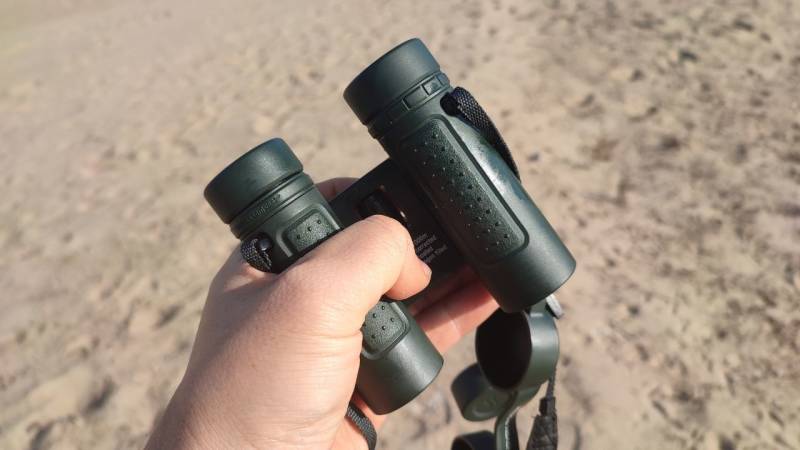
binoculars
Noun
Meaning
Binoculars are essential tools for outdoor enthusiasts, including survivalists, bushcrafters, and hikers. These handheld optical devices consist of two telescopes mounted side by side, allowing you to see distant objects with enhanced clarity and detail. Binoculars are particularly useful in the wilderness, as they enable you to scout for potential hazards, locate water sources, and spot wildlife from a safe distance. With their compact and lightweight design, binoculars are easy to carry and can greatly enhance your situational awareness in the great outdoors. Whether you're camping, hiking, or exploring, binoculars are a must-have item for any outdoor adventure.

Examples
„I love using my binoculars to spot wildlife while hiking in the wilderness. They help me get a closer look at birds, deer, and other animals from a safe distance.“
„During our camping trip, my friend and I used our binoculars to scout for a good fishing spot by the lake. We were able to spot a school of fish swimming near the shore.“
„When I go on survival expeditions, I always make sure to pack my binoculars. They are essential for scanning the surroundings and identifying potential hazards or resources.“
„While on a nature walk, I came across a rare bird species that I had never seen before. Thankfully, I had my binoculars with me, allowing me to observe its unique features in detail.“
„My dad taught me how to use binoculars when I was a kid, and it has become a lifelong passion of mine. I enjoy spending hours observing nature and discovering hidden wonders through my trusty binoculars.“
Origin
The word "binoculars" originates from the Latin word "binoculus," which means "having two eyes." The concept of binocular vision, or the ability to see with both eyes simultaneously, has been known since ancient times. However, the modern binoculars as we know them today were developed in the 17th century.
The first binoculars were created by combining two telescopes side by side, allowing for a wider field of view and improved depth perception. These early binoculars were primarily used for military purposes, such as spotting enemy movements and surveying the battlefield.
Over the years, binoculars have evolved and become more compact, lightweight, and versatile. They have found applications in various fields, including astronomy, birdwatching, hunting, and outdoor activities. Today, binoculars are designed with advanced optics, coatings, and features to provide clear and magnified views of distant objects.
Binoculars have become an essential tool for nature enthusiasts, adventurers, and survivalists alike. They allow you to observe wildlife, navigate unfamiliar terrain, and spot potential dangers from a distance. Whether you're exploring the wilderness, birdwatching in your backyard, or embarking on a survival expedition, a pair of binoculars can greatly enhance your experience and increase your chances of success.
Synonyms
Field glasses, Spyglasses, Opera glasses, Optical instrument, Telescope, Monocular, Scope, Viewing device
Antonyms
Monoculars, Telescopes, Magnifying glasses, Microscopes, Spyglasses, Periscopes, Spotting scopes, Opera glasses
Relatives
Telescope, Optics, Field glasses, Spyglass, Rangefinder, Monocular, Zoom, Magnification
Historical and cultural importance
Binoculars, also known as field glasses, have a rich historical and cultural significance. These optical devices have been used for centuries to enhance our vision and explore the world around us.
The invention of binoculars can be traced back to the 17th century, when Dutch mathematician and astronomer, Hans Lippershey, first combined two telescopes to create a single device with dual eyepieces. This innovation revolutionized the way we observe distant objects, making it easier to study celestial bodies and navigate the seas.
Throughout history, binoculars have played a crucial role in various fields, including military operations, wildlife observation, and outdoor activities. During World War I and II, binoculars were essential tools for soldiers, allowing them to scout enemy positions and gather valuable intelligence.
In the realm of nature and wildlife, binoculars have become indispensable for birdwatchers, nature enthusiasts, and wildlife photographers. They enable us to observe animals in their natural habitats without disturbing or endangering them. Binoculars also enhance our ability to appreciate the intricate details of flora and fauna, fostering a deeper connection with the natural world.
Binoculars have also found their place in popular culture, often associated with adventure, exploration, and survival. They are frequently depicted in movies, books, and artwork as essential tools for adventurers, explorers, and detectives.
Today, binoculars continue to evolve with advanced technologies, offering improved optics, durability, and portability. They have become more accessible to the general public, allowing everyone to experience the wonders of magnified vision and connect with the world in a new way.
More information about the term binoculars
Exploring the Wilderness with Binoculars
When it comes to exploring the wilderness, having a reliable pair of binoculars is essential. Binoculars are a versatile tool that can enhance your outdoor experience in numerous ways. Whether you're a nature enthusiast, a birdwatcher, or a survivalist, binoculars can provide you with a closer look at the world around you.
Observing Wildlife
One of the main reasons why binoculars are a must-have for any outdoor enthusiast is their ability to bring wildlife closer to you. With a good pair of binoculars, you can observe animals in their natural habitat without disturbing them. Whether you're tracking a deer, spotting a bird in flight, or identifying a distant animal, binoculars allow you to see the details that would otherwise be missed by the naked eye.
Binoculars also come in handy when it comes to safety. By scanning the area with binoculars, you can spot potential dangers such as predators or hazardous terrain before getting too close. This can be especially useful in survival situations where being aware of your surroundings is crucial.
Navigation and Orientation
Binoculars can also be used for navigation and orientation in the wilderness. By using binoculars to identify landmarks or distant features, you can get a better sense of your location and plan your route accordingly. This can be particularly useful when hiking in unfamiliar terrain or when trying to find your way back to camp.
In addition, binoculars can help you spot trails, water sources, or potential shelter locations from a distance. This can save you time and energy by allowing you to make informed decisions about your route or campsite.
Survival and Signaling
In survival situations, binoculars can be a valuable tool for signaling for help. By using binoculars to scan the horizon, you can increase your chances of being spotted by search and rescue teams or other potential rescuers. Binoculars can also help you identify potential sources of food, water, or shelter in a survival situation.
Furthermore, binoculars can be used for fire starting. By focusing sunlight through the lenses, you can create a concentrated beam of light that can ignite dry tinder or kindling. This technique, known as solar fire starting, can be a lifesaver in emergency situations.
Conclusion
Whether you're an avid nature lover, a survival enthusiast, or simply someone who enjoys spending time in the great outdoors, binoculars are an invaluable tool. They allow you to observe wildlife, navigate through the wilderness, and increase your chances of survival in emergency situations. So, before your next adventure, make sure to pack a reliable pair of binoculars and get ready to explore the wilderness like never before.
Back to overview

